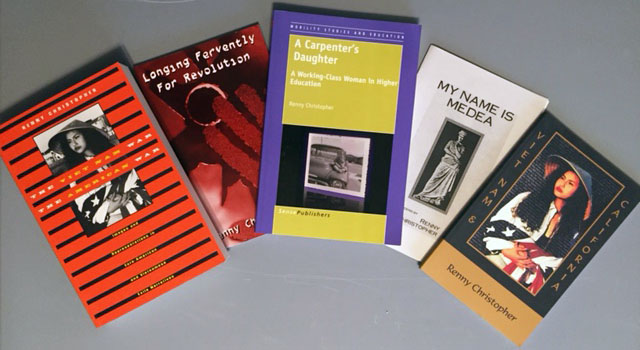Longing Fervently for Revolution: Upward Mobility and Its Discontents
Winner of the 1998 Slipstream Press Poetry Chapbook Competition
"Renny Christopher's poetry demonstrates that poetry can be a powerful access to understanding: her poems allow working-class people to feel visible and respected in a genre that usually ignores or objectifies them." --Carolyn Whitson, Metropolitan State University
May 4, 1970
In my first year of high school
my friends already talked
of marriage and children.
When they did I put my hands
over my ears.
A teacher told me
I'd never get a husband
if I didn't stop answering
all of the questions in class.
My friends talked of work.
I had no talent, like my mom,
for fixing hair.
And I was
too clumsy for a waitress
too sarcastic for a store clerk
too selfish for a nurse
too impatient for a factory line.
I was smart,
so I could be a secretary.
But restlessness ran in my veins--
I crossed my arms, clamped my jaw
and refused to learn how to type.
I didn't know what to dream of,
so I watched the news,
looking for a clue.
I wanted to see those places far from here
where there were wars.
I yearned for the rifle in my hands
but had to settle for shooting beebees
at popsicle sticks in the creek
while dreaming of being a boy,
joining the marines.
The TV seemed the only window
out of the living room walls.
My mother walked back and forth
while cooking dinner.
She paused
her worn hand resting
on the back of my chair
while Huntley and Brinkley
gave us the news.
We heard their voices explain while
we saw on the screen the face of a long-haired girl
shouting and raising a fist.
The camera bobbled, moved,
focused on a boy lying face down,
moved again to students
screaming at soldiers whose guns pointed
at the camera. This time the war
not overseas, but in Ohio.
"I hope this trouble's over,"
my mother said,
"before you go off to college."
She had never said
I could go to college.
Kids from my town became
the soldiers, never the students.
What she said made my heart beat faster
but I never turned away
from the guns on the TV.
As I stared I thought
yes, yes.
On the screen I saw a way out.
The shooting and the panic
matched the anger in my hands,
matched the silent screams ringing in my ears,
screaming no against
those possible futures that I knew,
screaming yes
for the new, the unimagined.
I watched the distant college campus
on the little screen
and I longed fervently
for revolution.
In my first year of high school
my friends already talked
of marriage and children.
When they did I put my hands
over my ears.
A teacher told me
I'd never get a husband
if I didn't stop answering
all of the questions in class.
My friends talked of work.
I had no talent, like my mom,
for fixing hair.
And I was
too clumsy for a waitress
too sarcastic for a store clerk
too selfish for a nurse
too impatient for a factory line.
I was smart,
so I could be a secretary.
But restlessness ran in my veins--
I crossed my arms, clamped my jaw
and refused to learn how to type.
I didn't know what to dream of,
so I watched the news,
looking for a clue.
I wanted to see those places far from here
where there were wars.
I yearned for the rifle in my hands
but had to settle for shooting beebees
at popsicle sticks in the creek
while dreaming of being a boy,
joining the marines.
The TV seemed the only window
out of the living room walls.
My mother walked back and forth
while cooking dinner.
She paused
her worn hand resting
on the back of my chair
while Huntley and Brinkley
gave us the news.
We heard their voices explain while
we saw on the screen the face of a long-haired girl
shouting and raising a fist.
The camera bobbled, moved,
focused on a boy lying face down,
moved again to students
screaming at soldiers whose guns pointed
at the camera. This time the war
not overseas, but in Ohio.
"I hope this trouble's over,"
my mother said,
"before you go off to college."
She had never said
I could go to college.
Kids from my town became
the soldiers, never the students.
What she said made my heart beat faster
but I never turned away
from the guns on the TV.
As I stared I thought
yes, yes.
On the screen I saw a way out.
The shooting and the panic
matched the anger in my hands,
matched the silent screams ringing in my ears,
screaming no against
those possible futures that I knew,
screaming yes
for the new, the unimagined.
I watched the distant college campus
on the little screen
and I longed fervently
for revolution.
